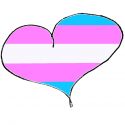Transphobia in Canada: A look into the issue, and what must be done.

By Avreet Jagdev
Transphobia is a term that refers to discrimination against transgender and gender-queer people. At the core, it is rooted in a rejection of transgender identity, and refusing to acknowledge or understand that being transgender, non-binary, or gender-queer is valid and real.
Transphobia can manifest in many forms: from verbal and physical harassment and abuse, to the removal of trans rights, to the systematic exclusion of trans people. In Canada, members of the trans community say that they are seeing and experiencing signs of rising transphobia across the country.
In the past, Canada has taken action towards protecting trans rights. Notably, the passing of Bill C-16 in 2017 amended the Canadian Human Rights Act to include gender identity and expression to the list of prohibited grounds of discrimination. Despite this act, transphobia continues to exist in Canada today. One example is the rise in opinion articles, published by news organizations including the Toronto Star and CBC, which have pushed transphobic ideas and opinions.
It is very harmful to members of the trans community when anti-trans ideology is publicly shared online, especially when it is done from widely known and credible sources such as CBC and Toronto Star. The problem doesn’t end here, however. Even notable author J.K Rowling was criticized for transphobia, for her stance against inclusive terms such as “people who menstruate”. She believes terms such as these take away from the women’s rights movement. However, these terms are essential to the inclusion of transgender, non-binary, and gender queer people in the fight against period stigma.
Outside of transphobia in the news and from public figures, anti-trans discrimination impacts transgender people in their personal lives, such as at work or school. This is often done through misgendering, which trans people can often experience from their peers, co-workers, or managers. Misgendering is when people refer to a transgender, nonbinary, or gender queer person using terms or pronouns related to how they identified before transitioning. This can be intentional or unintentional, but is harmful because it invalidates trans identity. This has negative consequences for the overall mental health of the misgendered person, by making them feel invalid, not understood, and stigmatized.
Rising levels of transphobia are evident in many other Canadian news headlines. In July, a family-friendly drag show in Victoria was canceled after the cafe it was planned to be hosted at received violent and threatening calls, with one caller even threatening to “shoot up the place”. Drag story-time events in public libraries have also received criticism rooted in homophobia and transphobia. Meanwhile, Pride flags in various locations in Ontario and British Columbia have been ripped down, and a seventeen year old in Mississauga was arrested for threatening to conduct a mass shooting at Pride celebration.
Evidently, transphobia is rampant in Canada, despite trans identities being legally protected by Bill C-16. It is important to take action against all forms of discrimination when we see it, including anti-trans and LGBTQ discrimination. You can help lessen the harmful impact of anti-trans discrimination by being a good ally to the transgender and queer people in your community, and by unconditionally respecting and celebrating their identities.





Leave a comment!